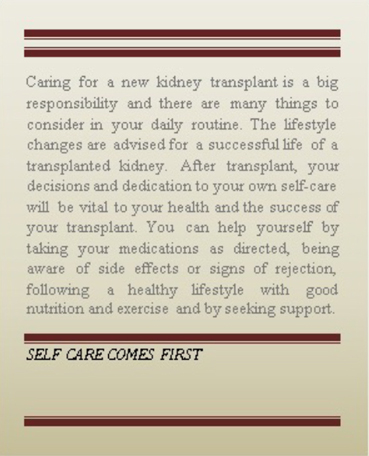

Medication:
Only you are responsible for taking the medications that have been prescribed for you. You should talk to your doctor to understand fully:
- The name and purpose of each medication
- When to take each medication
- How to take each medication
- How long to continue taking each medication
- Principal side effects of each medication
- What to do if he forgets to take a dose
- When to order more medication so it doesn’t run out
- How to order or obtain medications
- What to avoid while taking medications
Fluid goals:
If your new kidney is working, drink plenty of fluid. You are no longer on a fluid restriction. Dehydration can be harmful to the new kidney
Protein:
In the first 2 months after transplant, you need more protein to heal after surgery, fight infection, and provide energy. Protein-rich foods include: Lean meats, poultry, fish, Low-fat or nonfat milk, yogurt, cheese, Eggs, egg substitutes (such as Egg Beaters®),Dried beans, peas, nuts,Tofu, other soy foods.

Potassium:
Your transplant medications can cause a high potassium level in your blood. Your Doctor or Dietitian may tell you to avoid foods high in potassium. High-potassium foods include:Some fruits, including melons, bananas, avocados, oranges,Some vegetables, including potatoes, tomatoes, dark leafy greens,Chocolate, Dried beans, lentils
Sodium:
Limit sodium to help control fluid retention and blood pressure. Avoid adding salt to foods.Foods that you may also limit include:Salt seasonings (such as garlic salt, soy sauce),Cured meats (such as ham, bacon, sausage),Lunch meats (such as salami, bologna),Frozen meals that have more than 600 mg sodium per serving,Pickles and olives,Canned foods with added salt (such as canned vegetables and soups), Fast food and many restaurant foods
Food Safety: Transplant drugs can lower your immune system and increase your risk for food-borne illness.You can reduce your risk by handling food safely:
- Avoid raw and undercooked meats, seafood, and eggs, and unpasteurized dairy products.
- Always wash fresh fruits and vegetables well before eating.
- Keep cold foods cold and hot foods hot.
Weight Management and Cholesterol:
Your appetite may improve after transplant. It is important to maintain a healthy weight after transplant to keep your new kidney healthy. Weigh yourself often and avoid high-calorie foods, such as fatty foods and sweets. Follow a heart-healthy diet to control your weight and lower your risk of high cholesterol, high blood pressure, and diabetes.
- Choose lean meats, poultry, and fish. Trim all visible fat off meat before cooking.
- Choose low-fat or nonfat dairy products.
- Choose olive or canola oil
- Avoid fried foods. Bake, roast, broil, boil, or sauté foods instead.
- Choose foods high in fiber, such as whole grains, legumes, and fresh fruits and vegetables.
- Aim for 25-35 grams of fiber per day.
Exercise:
Once you're home, the best activity in the first few weeks is walking. After transplant, exercise can: Help to control your weight;Strengthen your heart; Improve your endurance; Keep your bones healthy.
Any form of sports that require physical exertion, body contact such as wrestling and football, and water contacts like in swimming needs to be avoided.
Smoking and Drinking Smoking is strictly forbiddenas it increases the chances of malignancies (cancer) and vascular disease (heart attacks and strokes) in immuno-suppressed persons. It is better to avoid alcohol too. Alcohol can itself cause liver disease and it will also aggravate the incidence of acid peptic disease. Consult the treating doctor about occasional consumption of light drinks.